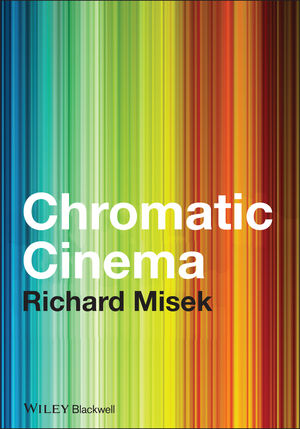Chromatic Cinema: A History of Screen ColorISBN: 978-1-4443-3239-1
Hardcover
240 pages
April 2010, Wiley-Blackwell
 |
||||||
“Chromatic Cinema provides a much-needed technological history of machines and techniques for producing moving images in color, as well as a cultural history of color films.” (BRIAN R. JACOBSON, Technology and Culture, July 2012)
“An invigorating critical intervention into the history, theory and aesthetic analysis of colour in the cinema.” (JENNIFER M. BARKER, Screen, August 2012)
“Chromatic Cinema provides a wealth of information and of examples of different approaches to colour in cinema and stimulates enough thoughts and reflections to be a worthy addition to any library on colour in cinema.” (NICOLA MAZZANTI, Historical Journal of Film, Radio and Television, April 2012
"Chromatic Cinema is an excellent critical history of screen colour by Richard Misek, who teaches at the University of Bristol, near which, as I recall, is a plaque to mark the birthplace of William Friese-Greene, the somewhat unfortunate British movie pioneer, one of who patents was for his own colour system." (Times Literary Supplement, 25 November 2011)"The book touches on most of the important aspects of color cinema-from history to technology to ideology-and serves as an orientation course for a complex subject. It's a gateway read, neither intimidating nor frustrating. For a beginner (like me), it presented a smattering of philosophical ideas, a grounding in the why and how progression of color use, and a primer on the science of color technologies." (MUBI, September 2010)
"This remarkable manuscript opens new vistas on what cinema is, how it works, and what it can mean, with a deep historical perspective and an unobtrusive but effective deployment of film theory. It is bound to be a major intervention in an exciting and growing field of film studies, and a significant contribution to technology studies." Sean Cubitt, author of The Cinema Effect"Drawing on optical theory, art history, and film technology, Richard Misek rejects conventional distinctions between color and black-and-white, arguing instead for a 'chromatic cinema' which sees color everywhere. Original, thought-provoking, and sure to be controversial." Richard Koszarski, Rutgers University
"In this important and surprising study of cinema’s most central, seemingly simple, and notorious opposition--black and white versus color--Misek upsets the usual categories for understanding the development of cinema as technology and aesthetic practice. Chromatic Cinema should change the way we understand the so-called evolution of film style as the triumph of realism." Brian Price, Oklahoma State University
"The best color history with examples from Hollywood, the European Art Film, Asia and Eastern Europe, Chromatic Cinema moves from the early period to the advent of the digital, by arguing that the use of black and white must be discussed in the context of an ever-changing chromatic image. An indispensable text from the introductory to the advanced level, Richard Misek dialogues with art history and philosophy, with cultural history and economics." Angela Dalle Vacche, Georgia Istitute of Technology



